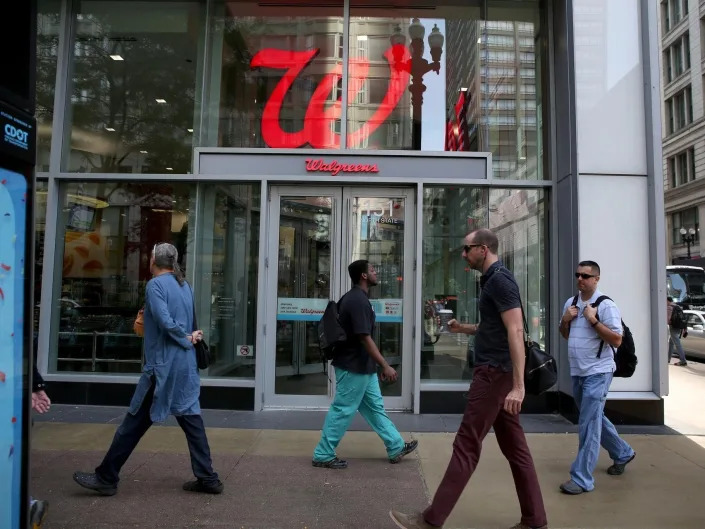Isobel Lewis
Tue, 7 March 2023

Michael Moore has called for a boycott of US pharmacy chain Walgreens over the company’s refusal to sell abortion pills in 21 states.
Last week, the retailer announced that it would no longer be selling mifepristone, the first of two medications necessary for a medication abortion, in 20 US states. The news follows the overturning of Roe v Wade in the US in June 2022.
Medication abortion is the most common kind of abortion in the US and is currently legal in 37 states – including states where the retailer will no longer offer the medication.
On Monday (6 March), Bowling for Columbine director Moore shared a blog post on his Substack titled: “Boycott Walgreens, a Pharmacy that Stands with Anti-Abortion Extremists Against the Rights of Women.”
In the post, the filmmaker accused the pharmacy chain of “caving in to threats from the extremist anti-abortion/Forced Birth movement”.
“This decision by Walgreens to further cement women’s status as second-class citizens must be met forcefully by each and every one of us,” he wrote. “Every day of our silence since last Thursday is another day of you and I enabling this bigotry and misogyny.
“Please join with me and others in a NATIONWIDE BOYCOTT OF WALGREENS. They must reverse their decision immediately. They must acknowledge that nearly 70 per cent of all Americans believe this legal prescription [should] be made easily available to all women — and that the vast majority of Americans still support Roe v Wade.”

Moore called for a boycott on his blog (Getty Images)
He continued: “I ask you to please make your voice heard. Contact your local reproductive rights group, women’s group, or connect nationally… Let Walgreens know you have stopped shopping there. Let the other pharmaceutical chains know you’ll do the same to them if they follow Walgreens’ lead.
“Picket your local Walgreens. Tell the White House to stand strong, and let your members of Congress know this is one of your top issues in deciding how you will vote next year. WE are the Majority.”
The Independent has contacted Walgreens for comment.
On Monday (6 March), governor of California Gavin Newsom said that the state was “done” with Walgreens following their decision.
“California won’t be doing business with @walgreens – or any company that cowers to the extremists and puts women’s lives at risk,” he tweeted. “We’re done.”
In February, Republican attorney generals of 20 states signed a letter to Walgreens threatening the company over its distribution of mifepristone. These are the same 20 states the retailer will no longer sell the drug in.
Businesses have faced pressure from anti-abortion groups who are seeking to fully cut off abortion access following last June’s Supreme Court ruling.
Walgreens' mixed messaging on abortion pills landed it in the political crossfire, and its clarifications may not be enough to avoid a boycott
Rebecca Cohen
Tue, March 7, 2023

BIZ-SCOTUS-ABORTION-WALGREENS-TBChicago Tribune / Getty Images
Walgreens says it will sell abortion ills in states where it is "legally permissible to do so."
The drugstore had assured Kansas' attorney general that it wouldn't provide Mifepristone in the state.
The mixed messaging sparked fury from abortion rights groups and calls for boycotts.
Following nationwide calls to boycott Walgreens, the drugstore chain clarified its decision on selling abortion pills, saying it will distribute Mifepristone — the drug approved by the FDA to abort a pregnancy — "in any jurisdiction where it is legally permissible to do so."
But the new statement may not be enough to quell outrage as the pharmacy lands square in the middle of the country's contentious abortion debate.
The move comes after over a month of back-and-forth between Walgreens and 20 Attorneys General, who, on February 1, wrote to the chain — and several other pharmacies including CVS, Walmart, and Costco — telling them it would be illegal to distribute abortion pills through the mail.
Later that week, Kansas' Attorney General followed up with the healthcare giant, emphasizing that the state "will not hesitate to enforce the law."
On February 17, Danielle Gray, Executive Vice President and Global Chief Legal Officer at Walgreens' holding company, responded to Kansas AG Kris Kobach. She said Walgreens "does not intend" to sell Mifepristone at any of its locations in the state.
A spokesperson for Walgreens told Insider on Friday that it responded to the initial inquiry from the 20 AGs and assured them that it would not sell Mifepristone in any of their states, though it could not confirm the states in which the medication would be legally sold.
But that group includes Alaska, Iowa, Kansas, and Montana, where the procedure and medications for abortions are largely still legal, Politico first reported.
The spokesperson added that Walgreens still intends to become an FDA-certified seller of the pills, and will distribute the pills "only in those jurisdictions where it is legal and operationally feasible."
The move sparked a backlash from abortion rights supporters, specifically in states where abortion is still legal, with California Gov. Gavin Newsom vowing the state will boycott Walgreens.
"California won't be doing business with @walgreens — or any company that cowers to the extremists and puts women's lives at risk. We're done," Newsom tweeted on Monday.
Illinois Gov. JB Pritzker sent a message on Thursday to all of the other pharmacy chains in light of this news: "We'll stand with you so you can provide this lifesaving care," adding that Walgreens should "rethink their policy."
Ron Klain, President Joe Biden's former Chief of Staff, also chimed in.
"Their slogan is "Trusted since 1901" -- but if @Walgreens won't fill prescriptions for lawful, needed medicines, where is the "trust" in that?"
By Monday, Walgreens had put out a new statement that assured customers it would sell Mifepristone at locations in states where it was legal.
"We want to be very clear about what our position has always been: Walgreens plans to dispense Mifepristone in any jurisdiction where it is legally permissible to do so," a statement from Walgreens said, reversing its initial messaging that it would sell Mifepristone where it is "legal and operationally feasible."
"Once we are certified by the FDA, we will dispense this medication consistent with federal and state laws. Providing legally approved medications to patients is what pharmacies do, and is rooted in our commitment to the communities in which we operate," the statement concluded.
Walgreens still has not released any information on which states it plans to distribute Mifepristone.
Walgreens did not respond to questions asking in which states it would sell Mifepristone. Kansas AG Kris Kobach's office also did not respond to Insider's request for comment.
Rebecca Cohen
Tue, March 7, 2023

BIZ-SCOTUS-ABORTION-WALGREENS-TBChicago Tribune / Getty Images
Walgreens says it will sell abortion ills in states where it is "legally permissible to do so."
The drugstore had assured Kansas' attorney general that it wouldn't provide Mifepristone in the state.
The mixed messaging sparked fury from abortion rights groups and calls for boycotts.
Following nationwide calls to boycott Walgreens, the drugstore chain clarified its decision on selling abortion pills, saying it will distribute Mifepristone — the drug approved by the FDA to abort a pregnancy — "in any jurisdiction where it is legally permissible to do so."
But the new statement may not be enough to quell outrage as the pharmacy lands square in the middle of the country's contentious abortion debate.
The move comes after over a month of back-and-forth between Walgreens and 20 Attorneys General, who, on February 1, wrote to the chain — and several other pharmacies including CVS, Walmart, and Costco — telling them it would be illegal to distribute abortion pills through the mail.
Later that week, Kansas' Attorney General followed up with the healthcare giant, emphasizing that the state "will not hesitate to enforce the law."
On February 17, Danielle Gray, Executive Vice President and Global Chief Legal Officer at Walgreens' holding company, responded to Kansas AG Kris Kobach. She said Walgreens "does not intend" to sell Mifepristone at any of its locations in the state.
A spokesperson for Walgreens told Insider on Friday that it responded to the initial inquiry from the 20 AGs and assured them that it would not sell Mifepristone in any of their states, though it could not confirm the states in which the medication would be legally sold.
But that group includes Alaska, Iowa, Kansas, and Montana, where the procedure and medications for abortions are largely still legal, Politico first reported.
The spokesperson added that Walgreens still intends to become an FDA-certified seller of the pills, and will distribute the pills "only in those jurisdictions where it is legal and operationally feasible."
The move sparked a backlash from abortion rights supporters, specifically in states where abortion is still legal, with California Gov. Gavin Newsom vowing the state will boycott Walgreens.
"California won't be doing business with @walgreens — or any company that cowers to the extremists and puts women's lives at risk. We're done," Newsom tweeted on Monday.
Illinois Gov. JB Pritzker sent a message on Thursday to all of the other pharmacy chains in light of this news: "We'll stand with you so you can provide this lifesaving care," adding that Walgreens should "rethink their policy."
Ron Klain, President Joe Biden's former Chief of Staff, also chimed in.
"Their slogan is "Trusted since 1901" -- but if @Walgreens won't fill prescriptions for lawful, needed medicines, where is the "trust" in that?"
By Monday, Walgreens had put out a new statement that assured customers it would sell Mifepristone at locations in states where it was legal.
"We want to be very clear about what our position has always been: Walgreens plans to dispense Mifepristone in any jurisdiction where it is legally permissible to do so," a statement from Walgreens said, reversing its initial messaging that it would sell Mifepristone where it is "legal and operationally feasible."
"Once we are certified by the FDA, we will dispense this medication consistent with federal and state laws. Providing legally approved medications to patients is what pharmacies do, and is rooted in our commitment to the communities in which we operate," the statement concluded.
Walgreens still has not released any information on which states it plans to distribute Mifepristone.
Walgreens did not respond to questions asking in which states it would sell Mifepristone. Kansas AG Kris Kobach's office also did not respond to Insider's request for comment.
Walgreens internal memo says it is following the law on abortion pill distribution
Anjalee Khemlani
·Senior Reporter
Tue, 7 March 2023
Walgreens (WBA) is facing significant backlash after responding to a letter from more than 20 Attorneys General, telling them that it does not intend to dispense abortion pills in states via mail order where it is illegal. Meanwhile, in a memo to employees obtained by Yahoo Finance, CEO Roz Brewer tried to assure them that the company would, as it has done all along, consider selling mifepristone in states where it is legal.
In a separate, but similar, controversial letter to Kansas Attorney General Kris Kobach, Walgreens said it "does not intend to dispense mifepristone within your state and does not intend to ship Mifepristone into your state from any of our pharmacies. If this approach changes, we will be sure to notify you."
But the response, similarly sent to the 20 other AGs in Republican-lead states, according to a report by Politico, has spurred criticism ranging from calls to withdraw its decision from U.S. lawmakers and an all out boycott of the drug chain giant on social media.
Various reports have erroneously said that Walgreens will stop dispensing the drug. In reality, it has not begun that process. Furthermore, it would not be legally allowed to sell the drug in states with abortion bans in place.
"What we're talking about hasn't even happened. This is more about how will this affect access in the future," said Alina Salganicoff, a senior vice president and the director of Women's Health Policy at Kaiser Family Foundation.
The FDA decision in January to allow retail pharmacies to apply for approval to dispense the pill, known generically as mifepristone — a process which could take several months— is the reason behind the backlash. During the pandemic, the Biden administration temporarily waived restrictions on mail order for the pill, and in January made the change permanent.
In the internal memo, Brewer expressed an understanding of the sensitive issue.
"I understand that our team members, patients and customers have deeply-held beliefs on this issue, and we must be very respectful of those beliefs," Brewer said, adding that other retailers like CVS (CVS) and Rite Aid (RAD) are also applying to distribute the pill.
"I want to be very clear about what our position has been all along: Walgreens plans to dispense mifepristone where it is legal, and not to dispense mifepristone where it is illegal," Brewer, a former executive of Walmart and Starbucks, said.
The FDA decision follows the overturning of Roe v. Wade in the U.S. Supreme Court last year. Mifepristone is one of two pills used for early-stage abortion, up to 10 weeks, which blocks a hormone that would allow the pregnancy to continue. It is considered an oral contraceptive but has been highly regulated by the FDA, requiring a doctor's consultation to use. The second pill is misoprostol, which is commonly used to prevent stomach ulcers, but also helps relax the uterus, and is already available at any pharmacy.
Legal issues ahead
The exchange with Kansas is a preview of what other pharmacies are set to contend with as a slew of court cases and legislation could impact their potential market share — and whether or not they end up dispensing it all.
This includes a case in Texas that threatens the use of mifepristone. The lawsuit alleges the FDA did not conduct proper testing of its use, and is one KFF and clinics like Planned Parenthood are monitoring closely.
While Kansas does allow the use of mifepristone for abortions, it has strict access rules. The state is currently in the process of banning tele-health abortion visits — which would take mail order off the table.
"At this time, we are working through the certification process, which includes the evaluation of our pharmacy network to determine where we will dispense Mifepristone and training protocols and updates for our pharmacists," the company said in its response to Kansas.
"Walgreens has not made any representations about using our mail order pharmacy business to dispense this drug," it added.

A hasty decision on mifepristone? A Walgreens store in Chicago. REUTERS/Eileen T. Meslar
Of the 20 states which signed on the separate letter, abortion is still legal in a few — but some of those could face legal challenges or are at various stages of restricting access to abortion.
The 20 include Missouri, Alabama, Alaska, Arkansas, Florida, Georgia, Indiana, Iowa, Kentucky, Louisiana, Mississippi, Montana, North Dakota, Ohio, Oklahoma, South Carolina, South Dakota, Texas, Utah, and West Virginia.
Florida, where abortion is legal, just introduced legislation Tuesday that would ban abortions after six weeks of pregnancy. This legislation mimics Texas's prior law, which was the strictest in the country short of a full ban, because it left women with an unreasonably tight window to find out they are pregnant and schedule the abortion. One study, for example, showed at least 33% of women find out they are pregnant after six weeks.
All told the situation remains dynamic, and any pharmacy, whether retail or online, is contending with the same uncertainty.
DiRx, an online pharmacy dealing in generics that is licensed in all 50 states and Washington, D.C., is doing the same thing Walgreens intends to do.
"This came up even earlier when the Roe v. Wade overturning was happening. We do ship oral contraceptives to states where it is legally OK to do so, without getting into the politics of it. Wherever there are question marks, we always make sure we check on the compliance aspects," said DiRx CEO Satish Srinivasan.
Walgreens is doing no different.
"Once we are certified by the FDA, we will dispense this medication consistent with federal and state laws. Providing legally approved medications to patients is what pharmacies do, and is rooted in our commitment to the communities in which we operate," the company said Monday.
Backlash
Despite the nuance involved, the response from Walgreens to the Attorneys General has caused significant backlash, with top U.S. lawmakers calling for a reversal of the decision as well as a boycott of the pharmacy. California Gov. Gavin Newsom is threatening to not do business with Walgreens.
California has been working on creating a generic drug manufacturing strategy for its residents, and the clash with Walgreens means it could be cut out of the distribution process if Newsom holds to the threat.
In addition, Walgreens is currently doing business with the state through its Medicaid and other government-run health services. It is not clear if Newsom's threat extends to the Medicaid program.
But the situation has still caught the attention of U.S. lawmakers and advocacy groups alike.
“This is the exact result anti-abortion actors want from their intimidation tactics. When politicians have the ability to interfere in the patient-provider relationship — in defiance of well-established science and medical evidence — people seeking access to timely, essential health care suffer," said Danika Wynn, vice president of abortion access at Planned Parenthood Federation of America, in a statement.
U.S. Sen. Elizabeth Warren (D-MA), meanwhile, expressed similar outrage on social media.
"It’s outrageous for MAGA extremists to intimidate pharmacies into refusing to dispense a medication that FDA deemed safe & effective over two decades ago," she said in a tweet, adding that all pharmacies should not be intimidated, including Walgreens, CVS and Rite Aid.
Follow Anjalee on Twitter @AnjKhem
The implications of Walgreens' decision on abortion pills


TOM MURPHY
Fri, March 3, 2023
Walgreens says it will not start selling an abortion pill in 20 states that had warned of legal consequences if it did so.
The drugstore chain’s announcement Thursday signals that access to mifepristone may not expand as broadly as federal regulators intended in January, when they finalized a rule change allowing more pharmacies to provide the pill.
Here’s a closer look at the issue.
ABOUT THE ABORTION PILL
The U.S. Food and Drug Administration approved mifepristone in 2000 to end pregnancy, when used in combination with a second drug, misoprostol. The combination is approved for use up to the 10th week of pregnancy.
Mifepristone is taken first to dilate the cervix and block a hormone needed to sustain a pregnancy. Misoprostol is taken a day or two later, causing contractions to empty the uterus.
More than half of U.S. abortions are now done with pills rather than with a procedure, according to the Guttmacher Institute, a research group that supports abortion rights. In rare cases, the drug combination can cause excess bleeding, requiring emergency care.
WIDENING ACCESS
For more than 20 years, the FDA limited dispensing of mifepristone to a subset of specialty offices and clinics due to safety concerns.
The agency has repeatedly eased restrictions and expanded access, increasing demand even as state laws make the pills harder to get for many women.
In late 2021, the agency eliminated an in-person requirement for getting the pill, saying a new scientific review showed no increase in safety complications if the drug is taken at home. That change also permitted the pill to be prescribed via telehealth and shipped by mail-order pharmacies.
Earlier this year, the FDA further loosened restrictions by allowing pharmacies like Walgreens to start dispensing the drug after they undergo certification. That includes meeting standards for shipping, tracking and confidentially storing prescribing information.
STATES STEP IN
Typically, the FDA’s authority to regulate prescription drug access has gone unchallenged. But more than a dozen states now have laws restricting abortion broadly — and the pills specifically — following last year’s Supreme Court decision overturning the federal right to abortion.
Last month, attorneys general in 20 conservative-led states warned CVS and Walgreens in a letter that they could face legal consequences if they sell abortion pills by mail in their states.
In addition to state laws, attorneys general from conservative states have argued that shipments of mifepristone run afoul of a 19th century law that prohibited sending items used in abortion through the mail.
WALGREENS' REACTION
A spokesman says the company told the attorneys general that it will not dispense mifepristone in their states and it doesn't plan to ship the drug to them as well.
But Walgreens is working to become eligible through the FDA’s certification process. It plans to dispense the pills where it can legally do so.
The company is not currently dispensing the pills anywhere.
OTHER DRUGSTORES
Rite Aid Corp. said it was “monitoring the latest federal, state, legal and regulatory developments” and would keep evaluating its policies. The Associated Press also sought comment from CVS Health Corp., retail giant Walmart and the grocery chain Kroger.
Some independent pharmacists would like to become certified to dispense the pills, said Andrea Pivarunas, a spokeswoman for the National Community Pharmacists Association. She added that this would be a “personal business decision," based partly on state laws. The association has no specifics on how many will do it.
OTHER LEGAL ISSUES
In November, an anti-abortion group filed a federal lawsuit in Texas seeking to revoke mifepristone's approval, claiming the FDA approved the drug 23 years ago without adequate evidence of safety.
A federal judge could rule soon. If he sides with abortion opponents, mifepristone could potentially be removed from the U.S. market.
In January, abortion rights supporters filed separate lawsuits challenging abortion pill restrictions imposed in North Carolina and West Virginia.
Legal experts foresee years of court battles over access to the pills.
___
AP Health Writer Matthew Perrone contributed to this story.
___
The Associated Press Health and Science Department receives support from the Howard Hughes Medical Institute’s Science and Educational Media Group. The AP is solely responsible for all content.
Anjalee Khemlani
·Senior Reporter
Tue, 7 March 2023
Walgreens (WBA) is facing significant backlash after responding to a letter from more than 20 Attorneys General, telling them that it does not intend to dispense abortion pills in states via mail order where it is illegal. Meanwhile, in a memo to employees obtained by Yahoo Finance, CEO Roz Brewer tried to assure them that the company would, as it has done all along, consider selling mifepristone in states where it is legal.
In a separate, but similar, controversial letter to Kansas Attorney General Kris Kobach, Walgreens said it "does not intend to dispense mifepristone within your state and does not intend to ship Mifepristone into your state from any of our pharmacies. If this approach changes, we will be sure to notify you."
But the response, similarly sent to the 20 other AGs in Republican-lead states, according to a report by Politico, has spurred criticism ranging from calls to withdraw its decision from U.S. lawmakers and an all out boycott of the drug chain giant on social media.
Various reports have erroneously said that Walgreens will stop dispensing the drug. In reality, it has not begun that process. Furthermore, it would not be legally allowed to sell the drug in states with abortion bans in place.
"What we're talking about hasn't even happened. This is more about how will this affect access in the future," said Alina Salganicoff, a senior vice president and the director of Women's Health Policy at Kaiser Family Foundation.
The FDA decision in January to allow retail pharmacies to apply for approval to dispense the pill, known generically as mifepristone — a process which could take several months— is the reason behind the backlash. During the pandemic, the Biden administration temporarily waived restrictions on mail order for the pill, and in January made the change permanent.
In the internal memo, Brewer expressed an understanding of the sensitive issue.
"I understand that our team members, patients and customers have deeply-held beliefs on this issue, and we must be very respectful of those beliefs," Brewer said, adding that other retailers like CVS (CVS) and Rite Aid (RAD) are also applying to distribute the pill.
"I want to be very clear about what our position has been all along: Walgreens plans to dispense mifepristone where it is legal, and not to dispense mifepristone where it is illegal," Brewer, a former executive of Walmart and Starbucks, said.
The FDA decision follows the overturning of Roe v. Wade in the U.S. Supreme Court last year. Mifepristone is one of two pills used for early-stage abortion, up to 10 weeks, which blocks a hormone that would allow the pregnancy to continue. It is considered an oral contraceptive but has been highly regulated by the FDA, requiring a doctor's consultation to use. The second pill is misoprostol, which is commonly used to prevent stomach ulcers, but also helps relax the uterus, and is already available at any pharmacy.
Legal issues ahead
The exchange with Kansas is a preview of what other pharmacies are set to contend with as a slew of court cases and legislation could impact their potential market share — and whether or not they end up dispensing it all.
This includes a case in Texas that threatens the use of mifepristone. The lawsuit alleges the FDA did not conduct proper testing of its use, and is one KFF and clinics like Planned Parenthood are monitoring closely.
While Kansas does allow the use of mifepristone for abortions, it has strict access rules. The state is currently in the process of banning tele-health abortion visits — which would take mail order off the table.
"At this time, we are working through the certification process, which includes the evaluation of our pharmacy network to determine where we will dispense Mifepristone and training protocols and updates for our pharmacists," the company said in its response to Kansas.
"Walgreens has not made any representations about using our mail order pharmacy business to dispense this drug," it added.
A hasty decision on mifepristone? A Walgreens store in Chicago. REUTERS/Eileen T. Meslar
Of the 20 states which signed on the separate letter, abortion is still legal in a few — but some of those could face legal challenges or are at various stages of restricting access to abortion.
The 20 include Missouri, Alabama, Alaska, Arkansas, Florida, Georgia, Indiana, Iowa, Kentucky, Louisiana, Mississippi, Montana, North Dakota, Ohio, Oklahoma, South Carolina, South Dakota, Texas, Utah, and West Virginia.
Florida, where abortion is legal, just introduced legislation Tuesday that would ban abortions after six weeks of pregnancy. This legislation mimics Texas's prior law, which was the strictest in the country short of a full ban, because it left women with an unreasonably tight window to find out they are pregnant and schedule the abortion. One study, for example, showed at least 33% of women find out they are pregnant after six weeks.
All told the situation remains dynamic, and any pharmacy, whether retail or online, is contending with the same uncertainty.
DiRx, an online pharmacy dealing in generics that is licensed in all 50 states and Washington, D.C., is doing the same thing Walgreens intends to do.
"This came up even earlier when the Roe v. Wade overturning was happening. We do ship oral contraceptives to states where it is legally OK to do so, without getting into the politics of it. Wherever there are question marks, we always make sure we check on the compliance aspects," said DiRx CEO Satish Srinivasan.
Walgreens is doing no different.
"Once we are certified by the FDA, we will dispense this medication consistent with federal and state laws. Providing legally approved medications to patients is what pharmacies do, and is rooted in our commitment to the communities in which we operate," the company said Monday.
Backlash
Despite the nuance involved, the response from Walgreens to the Attorneys General has caused significant backlash, with top U.S. lawmakers calling for a reversal of the decision as well as a boycott of the pharmacy. California Gov. Gavin Newsom is threatening to not do business with Walgreens.
California has been working on creating a generic drug manufacturing strategy for its residents, and the clash with Walgreens means it could be cut out of the distribution process if Newsom holds to the threat.
In addition, Walgreens is currently doing business with the state through its Medicaid and other government-run health services. It is not clear if Newsom's threat extends to the Medicaid program.
But the situation has still caught the attention of U.S. lawmakers and advocacy groups alike.
“This is the exact result anti-abortion actors want from their intimidation tactics. When politicians have the ability to interfere in the patient-provider relationship — in defiance of well-established science and medical evidence — people seeking access to timely, essential health care suffer," said Danika Wynn, vice president of abortion access at Planned Parenthood Federation of America, in a statement.
U.S. Sen. Elizabeth Warren (D-MA), meanwhile, expressed similar outrage on social media.
"It’s outrageous for MAGA extremists to intimidate pharmacies into refusing to dispense a medication that FDA deemed safe & effective over two decades ago," she said in a tweet, adding that all pharmacies should not be intimidated, including Walgreens, CVS and Rite Aid.
Follow Anjalee on Twitter @AnjKhem
California to not do business with Walgreens over abortion pills issue- Governor
Mon, March 6, 2023
March 6 (Reuters) - California would not do business with Walgreens Boots Alliance Inc, state Governor Gavin Newsom said in a tweet on Monday, days after the pharmacy chain said it will not dispense abortion pills in some Republican states.
The state refuses to do business with Walgreens or "any company that cowers to the extremists and puts women's lives at risk," Democrat governor Newsom said.
Walgreens did not immediately respond to a Reuters request for comment.
The company said last week it will steer clear from 20 states, including states where abortion remains legal, where the Republican attorneys general have warned it of risking breaking the law if it distributed abortion pills.
The U.S. Food and Drug Administration in January allowed retail pharmacies to sell abortion pill mifepristone, including by mail, provided they were certified under special safety rules for the drug.
(Reporting by Raghav Mahobe in Bengaluru; Editing by Shinjini Ganguli
Mon, March 6, 2023
March 6 (Reuters) - California would not do business with Walgreens Boots Alliance Inc, state Governor Gavin Newsom said in a tweet on Monday, days after the pharmacy chain said it will not dispense abortion pills in some Republican states.
The state refuses to do business with Walgreens or "any company that cowers to the extremists and puts women's lives at risk," Democrat governor Newsom said.
Walgreens did not immediately respond to a Reuters request for comment.
The company said last week it will steer clear from 20 states, including states where abortion remains legal, where the Republican attorneys general have warned it of risking breaking the law if it distributed abortion pills.
The U.S. Food and Drug Administration in January allowed retail pharmacies to sell abortion pill mifepristone, including by mail, provided they were certified under special safety rules for the drug.
(Reporting by Raghav Mahobe in Bengaluru; Editing by Shinjini Ganguli
‘Dangerous and unacceptable’: White House condemns efforts to stop pharmacies from dispensing abortion pills
Alice Miranda Ollstein
Fri, March 3, 2023
The Biden administration Friday called Republican efforts to dissuade pharmacies from distributing abortion pills “dangerous and just unacceptable.”
The statement follows Walgreen’s decision, first reported by POLITICO, to not dispense the pills in nearly two-dozen states where GOP attorneys general have threatened them with legal action under the 19th century Comstock Act.
“This is all a part of a continued effort by anti-abortion extremists who want to use this arcane law to impose a backdoor ban on abortion,” White House press secretary Karine Jean-Pierre told reporters at the White House daily briefing, adding that the drug in question, mifepristone, “has been on the market for more than two decades, and is regularly used for both miscarriage management and abortion and is used in more than 60 countries.”
Jean-Pierre said that President Joe Biden will “continue to support access to this critical medication within the limits of the law,” but declined to specify what steps the administration would take or whether it has spoken to Walgreens or other pharmacy chains about abortion pill access.
Abortion pills are the most common way to end a pregnancy in the United States and have become a focus for anti-abortion groups and Republican officials seeking to block access in their states.
A group of doctors and conservative medical groups is suing to overturn the FDA’s approval of mifepristone and a federal judge could rule to cut off access to the medication nationwide at any time. The Biden administration has pledged to swiftly appeal any ruling that blocks people from obtaining the pills.
Jean-Pierre also noted Friday that the Justice Department released a memo earlier this year disputing arguments GOP attorneys general have made that the more-than-a-century-old Comstock Act, related to the distribution of “vice,” prohibits mailing abortion pills.
Mary Ziegler, a professor at the UC Davis School of Law who specializes in abortion rights, noted that Walgreens and the other pharmacies remain legally vulnerable despite the support of the Biden administration, given the conservative tilt of the federal judiciary that’s now weighing whether and how the pills can be dispensed — and the possibility that a future president could reverse course.
“Do I think there’s reason for Walgreens to worry? Sure. The DOJ’s non-enforcement stance is dependent on who is in the White House,” she said. “But the degree of caution is surprising. No suits have yet been filed. And the state officials’ threat is based on a very broad interpretation of a statute that hasn’t been enforced for over 100 years. So this is risk-aversion to the extreme.”
Walgreens confirmed to POLITICO on Thursday that the company told the 20-plus state attorneys general who pressed them not to become certified distributors of mifepristone that they will not do so in their states — including some states that don’t currently ban abortion or the use of the pills, such as Alaska, Iowa, Kansas and Montana.
Other pharmacies that Republican state attorneys general have pressured to not dispense abortion pills, including Albertsons, Costco, CVS, Kroger, Rite Aid, and Walmart, did not respond to repeated requests for comment.
While courts in Texas, New Mexico and elsewhere weigh arguments about whether the Comstock Act bars mail delivery of abortion pills, Republican attorneys general and anti-abortion groups are exploring other legal strategies to block access to the drugs.
Kansas Attorney General Kris Kobach, a Republican, told POLITICO he’s ready to sue pharmacies under the Racketeer Influenced and Corrupt Organizations Act if they move forward with becoming certified to dispense abortion pills.
“Evidently, Walgreens understood that my office was serious about this,” Kobach said.
Kansans voted overwhelmingly last summer to reject a constitutional amendment clearing the way for the passage of an abortion ban, and a court has blocked the state’s requirement that the pills only be obtained in person from a physician.
Zachary Kester, the general counsel for Students for Life, said his organization and other abortion opponents are also looking into using state and federal consumer protection laws, including the Deceptive Trade Practices Act some states have, to sue pharmacies that agree to fill prescriptions for the pills.
“The ban in Kansas is enjoined,” he argued. “But that doesn’t matter if a provider or pharmacist is making a false statement about an unsafe drug and failing to disclose the risks. If a woman is harmed, she or her husband or boyfriend could bring a claim.”
The FDA has repeatedly pointed to the pills’ safety record and low rate of complication — lower than many over-the-counter medications — as the agency has eased restrictions on the drug over the past few years.
Alice Miranda Ollstein
Fri, March 3, 2023
The Biden administration Friday called Republican efforts to dissuade pharmacies from distributing abortion pills “dangerous and just unacceptable.”
The statement follows Walgreen’s decision, first reported by POLITICO, to not dispense the pills in nearly two-dozen states where GOP attorneys general have threatened them with legal action under the 19th century Comstock Act.
“This is all a part of a continued effort by anti-abortion extremists who want to use this arcane law to impose a backdoor ban on abortion,” White House press secretary Karine Jean-Pierre told reporters at the White House daily briefing, adding that the drug in question, mifepristone, “has been on the market for more than two decades, and is regularly used for both miscarriage management and abortion and is used in more than 60 countries.”
Jean-Pierre said that President Joe Biden will “continue to support access to this critical medication within the limits of the law,” but declined to specify what steps the administration would take or whether it has spoken to Walgreens or other pharmacy chains about abortion pill access.
Abortion pills are the most common way to end a pregnancy in the United States and have become a focus for anti-abortion groups and Republican officials seeking to block access in their states.
A group of doctors and conservative medical groups is suing to overturn the FDA’s approval of mifepristone and a federal judge could rule to cut off access to the medication nationwide at any time. The Biden administration has pledged to swiftly appeal any ruling that blocks people from obtaining the pills.
Jean-Pierre also noted Friday that the Justice Department released a memo earlier this year disputing arguments GOP attorneys general have made that the more-than-a-century-old Comstock Act, related to the distribution of “vice,” prohibits mailing abortion pills.
Mary Ziegler, a professor at the UC Davis School of Law who specializes in abortion rights, noted that Walgreens and the other pharmacies remain legally vulnerable despite the support of the Biden administration, given the conservative tilt of the federal judiciary that’s now weighing whether and how the pills can be dispensed — and the possibility that a future president could reverse course.
“Do I think there’s reason for Walgreens to worry? Sure. The DOJ’s non-enforcement stance is dependent on who is in the White House,” she said. “But the degree of caution is surprising. No suits have yet been filed. And the state officials’ threat is based on a very broad interpretation of a statute that hasn’t been enforced for over 100 years. So this is risk-aversion to the extreme.”
Walgreens confirmed to POLITICO on Thursday that the company told the 20-plus state attorneys general who pressed them not to become certified distributors of mifepristone that they will not do so in their states — including some states that don’t currently ban abortion or the use of the pills, such as Alaska, Iowa, Kansas and Montana.
Other pharmacies that Republican state attorneys general have pressured to not dispense abortion pills, including Albertsons, Costco, CVS, Kroger, Rite Aid, and Walmart, did not respond to repeated requests for comment.
While courts in Texas, New Mexico and elsewhere weigh arguments about whether the Comstock Act bars mail delivery of abortion pills, Republican attorneys general and anti-abortion groups are exploring other legal strategies to block access to the drugs.
Kansas Attorney General Kris Kobach, a Republican, told POLITICO he’s ready to sue pharmacies under the Racketeer Influenced and Corrupt Organizations Act if they move forward with becoming certified to dispense abortion pills.
“Evidently, Walgreens understood that my office was serious about this,” Kobach said.
Kansans voted overwhelmingly last summer to reject a constitutional amendment clearing the way for the passage of an abortion ban, and a court has blocked the state’s requirement that the pills only be obtained in person from a physician.
Zachary Kester, the general counsel for Students for Life, said his organization and other abortion opponents are also looking into using state and federal consumer protection laws, including the Deceptive Trade Practices Act some states have, to sue pharmacies that agree to fill prescriptions for the pills.
“The ban in Kansas is enjoined,” he argued. “But that doesn’t matter if a provider or pharmacist is making a false statement about an unsafe drug and failing to disclose the risks. If a woman is harmed, she or her husband or boyfriend could bring a claim.”
The FDA has repeatedly pointed to the pills’ safety record and low rate of complication — lower than many over-the-counter medications — as the agency has eased restrictions on the drug over the past few years.
Calls to boycott Walgreens grow as pharmacy confirms it will not sell abortion pills in 20 states, including some where it remains legal
Aaron McDade
Fri, March 3, 2023

Walgreens pharmacy.Joe Raedle/Getty Images
Last month, 20 Republican attorneys general told Walgreens it could face legal action if it sold abortion pills in some states.
Walgreens told Politico it will not sell the pills in those states, which includes some where abortion is legal.
"Walgreens" and "#BoycottWalgreens" were trending on Twitter Thursday and Friday as users reacted to the policy.
Walgreens confirmed Thursday that it will not carry abortion pills in several states, including some in which the pills are still legal.
The phrases "Walgreens" and "#BoycottWalgreens" each trended on Twitter Thursday night into Friday morning as discussion ensued and some users vowed to stop supporting the chain.
The decision, first reported by Politico on Thursday, comes after 20 Republican attorneys general last month wrote to Walgreens and several other pharmacies including CVS, Walmart, and Costco to point out laws that could be violated if the companies provided abortion pills through the mail.
A Walgreens spokesperson told Insider in a statement that it has responded to the states represented by the 20 AGs, and confirmed it will not distribute the abortion pill Mifepristone in any of those states. That group includes Alaska, Iowa, Kansas, and Montana, where the procedure and medications for abortions are largely still legal, Politico reported.
The FDA announced in January that retail pharmacies would be allowed to distribute the pills to those with a prescription; the pills previously were only accessible through doctors or mail-order pharmacies. At the time, Walgreens told Insider that it was working to become FDA-certified to sell abortion pills in the states where they are legal.
A spokesperson told Insider Friday via email that Walgreens still intends to become an FDA-certified seller of the pills, and will distribute the pills "only in those jurisdictions where it is legal and operationally feasible."
While the company wrote to the 20 attorneys general that it would not dispense the pills in their states, it has still not publicly confirmed which states the pills may be available in or whether that list is affected by the policy confirmed Thursday.
Some Twitter users voiced their support of the decision from Walgreens, but several high-profile commentators and Democrats voiced their displeasure with the policy.
"Women across the nation will be denied their right to access healthcare they are legally entitled to because of this awful corporate decision," Illinois Gov. JB Pritzker, the highest level elected official in the state where Walgreens is headquartered, tweeted. "@Walgreens must rethink this policy. To all the other pharmacy providers, we'll stand with you so you can provide this lifesaving care."
Ron Klain, a longtime aide to President Joe Biden who left his White House role as Biden's chief of staff earlier this year, cited Walgreen's slogan in his response: "Their slogan is 'Trusted since 1901' -- but if @Walgreens won't fill prescriptions for lawful, needed medicines, where is the "trust" in that?"
"Absolutely awful. This willful corporate choice will prevent so many women from choosing the healthcare they need and have a legal right to," Sen. Tammy Duckworth, Illinois, tweeted. "@Walgreens should reverse course—immediately."
Responses to Politico's Alice Miranda Ollstein's original tweet announcing the news are also filled with hundreds of users saying they will "no longer be spending any money at Walgreens" or "never step foot in a Walgreens again."
Mifepristone is currently the subject of multiple lawsuits, with a Texas judge expected to deliver a ruling in the coming weeks on a challenge from Republican attorneys general looking to overturn the FDA's decades-old approval of the pill. Several Democratic attorneys general filed an argument in the case last month that said banning the pill would lead to an "unprecedented spike" in maternal mortality.
Aaron McDade
Fri, March 3, 2023

Walgreens pharmacy.Joe Raedle/Getty Images
Last month, 20 Republican attorneys general told Walgreens it could face legal action if it sold abortion pills in some states.
Walgreens told Politico it will not sell the pills in those states, which includes some where abortion is legal.
"Walgreens" and "#BoycottWalgreens" were trending on Twitter Thursday and Friday as users reacted to the policy.
Walgreens confirmed Thursday that it will not carry abortion pills in several states, including some in which the pills are still legal.
The phrases "Walgreens" and "#BoycottWalgreens" each trended on Twitter Thursday night into Friday morning as discussion ensued and some users vowed to stop supporting the chain.
The decision, first reported by Politico on Thursday, comes after 20 Republican attorneys general last month wrote to Walgreens and several other pharmacies including CVS, Walmart, and Costco to point out laws that could be violated if the companies provided abortion pills through the mail.
A Walgreens spokesperson told Insider in a statement that it has responded to the states represented by the 20 AGs, and confirmed it will not distribute the abortion pill Mifepristone in any of those states. That group includes Alaska, Iowa, Kansas, and Montana, where the procedure and medications for abortions are largely still legal, Politico reported.
The FDA announced in January that retail pharmacies would be allowed to distribute the pills to those with a prescription; the pills previously were only accessible through doctors or mail-order pharmacies. At the time, Walgreens told Insider that it was working to become FDA-certified to sell abortion pills in the states where they are legal.
A spokesperson told Insider Friday via email that Walgreens still intends to become an FDA-certified seller of the pills, and will distribute the pills "only in those jurisdictions where it is legal and operationally feasible."
While the company wrote to the 20 attorneys general that it would not dispense the pills in their states, it has still not publicly confirmed which states the pills may be available in or whether that list is affected by the policy confirmed Thursday.
Some Twitter users voiced their support of the decision from Walgreens, but several high-profile commentators and Democrats voiced their displeasure with the policy.
"Women across the nation will be denied their right to access healthcare they are legally entitled to because of this awful corporate decision," Illinois Gov. JB Pritzker, the highest level elected official in the state where Walgreens is headquartered, tweeted. "@Walgreens must rethink this policy. To all the other pharmacy providers, we'll stand with you so you can provide this lifesaving care."
Ron Klain, a longtime aide to President Joe Biden who left his White House role as Biden's chief of staff earlier this year, cited Walgreen's slogan in his response: "Their slogan is 'Trusted since 1901' -- but if @Walgreens won't fill prescriptions for lawful, needed medicines, where is the "trust" in that?"
"Absolutely awful. This willful corporate choice will prevent so many women from choosing the healthcare they need and have a legal right to," Sen. Tammy Duckworth, Illinois, tweeted. "@Walgreens should reverse course—immediately."
Responses to Politico's Alice Miranda Ollstein's original tweet announcing the news are also filled with hundreds of users saying they will "no longer be spending any money at Walgreens" or "never step foot in a Walgreens again."
Mifepristone is currently the subject of multiple lawsuits, with a Texas judge expected to deliver a ruling in the coming weeks on a challenge from Republican attorneys general looking to overturn the FDA's decades-old approval of the pill. Several Democratic attorneys general filed an argument in the case last month that said banning the pill would lead to an "unprecedented spike" in maternal mortality.
Walgreens Pulls Abortion Pills in Most Red States After Legal Threats

Michelle Fay Cortez
Fri, March 3, 2023
(Bloomberg) -- Walgreens Boots Alliance Inc. won’t sell abortion pills in 20 states after warnings by Republican attorneys general of legal action, a decision that limits the medication’s availability in many places where access to the procedure is already restricted.
A joint letter from a group of 20 Republican attorneys general warned executives at Walgreens and CVS Health Corp. that the companies could face legal consequences if they mail and distribute abortion medication in their states. The company won’t dispense mifepristone in those states, Fraser Engerman, a company spokesman, said in an emailed statement to Bloomberg News.
“I can confirm we have responded to each of the attorneys general who signed the letter dated Feb. 1 to Walgreens,” he said. “We will not dispense mifepristone in their states.”
State officials are taking steps to ensure access to medication abortion following the Walgreens decision. Illinois Attorney General Kwame Raoul met with the global chief legal officer at Walgreens Friday about the availability of the mifepristone at Walgreens stores.
“I was assured that where Walgreens can legally and operationally dispense mifepristone, its pharmacies will continue to do so,” Raoul said in a statement. “Their commitment included the state of Illinois, where more than half of abortions are medication abortions.”
Walgreens shares rose 2% Friday at the US market close.
Meanwhile, Illinois Governor J.B. Pritzker was set to meet with Walgreens executives late Friday to express concerns about the company’s decision, a spokesperson for Pritzker confirmed in an email.
Not all of the states have a total ban on abortion or expressly prohibit distribution of the medicine through the mail, but many have laws restricting the pills — like requiring them to be dispensed at a doctor’s office or in person. While the letter written by Missouri Attorney General Andrew Bailey was signed by most of his Republican counterparts, including those in Texas, Florida and West Virginia, others didn’t, including those from Idaho, Kansas, Nebraska, Pennsylvania and Virginia.
Access to the medication has become a flash point in the partisan war over abortion since the US Supreme Court overturned Roe v. Wade last year. The decision returned the issue to the states, where access to abortion was sharply limited or effectively barred in many of those led by Republicans.
Seeking Certification
The nation’s biggest pharmacy chains announced in January that they planned to seek US certification to sell the pills used in medication abortion, after the US Food and Drug Administration loosened restrictions on where the drugs could be dispensed. Previously, they could be distributed only in health care settings.
The attorneys general sent the letter Feb. 1, after the companies stated their intention. A rival missive was sent to executives at Walgreens and CVS by 23 Democratic state attorneys general two weeks later, urging them to ignore the legal threats from the GOP states. CVS didn’t immediately respond to a request for comment.
Walgreens isn’t currently dispensing mifepristone and only plans to do so in jurisdictions where it’s legal, Engerman wrote. The company stills intend to become a certified pharmacy, he said, a process that requires individual pharmacies to get government approval and navigate myriad state laws.
The company’s decision was reported earlier by Politico.
--With assistance from Madlin Mekelburg, Madison Muller, Fiona Rutherford and Shruti Date Singh.
Bloomberg Businessweek

Michelle Fay Cortez
Fri, March 3, 2023
(Bloomberg) -- Walgreens Boots Alliance Inc. won’t sell abortion pills in 20 states after warnings by Republican attorneys general of legal action, a decision that limits the medication’s availability in many places where access to the procedure is already restricted.
A joint letter from a group of 20 Republican attorneys general warned executives at Walgreens and CVS Health Corp. that the companies could face legal consequences if they mail and distribute abortion medication in their states. The company won’t dispense mifepristone in those states, Fraser Engerman, a company spokesman, said in an emailed statement to Bloomberg News.
“I can confirm we have responded to each of the attorneys general who signed the letter dated Feb. 1 to Walgreens,” he said. “We will not dispense mifepristone in their states.”
State officials are taking steps to ensure access to medication abortion following the Walgreens decision. Illinois Attorney General Kwame Raoul met with the global chief legal officer at Walgreens Friday about the availability of the mifepristone at Walgreens stores.
“I was assured that where Walgreens can legally and operationally dispense mifepristone, its pharmacies will continue to do so,” Raoul said in a statement. “Their commitment included the state of Illinois, where more than half of abortions are medication abortions.”
Walgreens shares rose 2% Friday at the US market close.
Meanwhile, Illinois Governor J.B. Pritzker was set to meet with Walgreens executives late Friday to express concerns about the company’s decision, a spokesperson for Pritzker confirmed in an email.
Not all of the states have a total ban on abortion or expressly prohibit distribution of the medicine through the mail, but many have laws restricting the pills — like requiring them to be dispensed at a doctor’s office or in person. While the letter written by Missouri Attorney General Andrew Bailey was signed by most of his Republican counterparts, including those in Texas, Florida and West Virginia, others didn’t, including those from Idaho, Kansas, Nebraska, Pennsylvania and Virginia.
Access to the medication has become a flash point in the partisan war over abortion since the US Supreme Court overturned Roe v. Wade last year. The decision returned the issue to the states, where access to abortion was sharply limited or effectively barred in many of those led by Republicans.
Seeking Certification
The nation’s biggest pharmacy chains announced in January that they planned to seek US certification to sell the pills used in medication abortion, after the US Food and Drug Administration loosened restrictions on where the drugs could be dispensed. Previously, they could be distributed only in health care settings.
The attorneys general sent the letter Feb. 1, after the companies stated their intention. A rival missive was sent to executives at Walgreens and CVS by 23 Democratic state attorneys general two weeks later, urging them to ignore the legal threats from the GOP states. CVS didn’t immediately respond to a request for comment.
Walgreens isn’t currently dispensing mifepristone and only plans to do so in jurisdictions where it’s legal, Engerman wrote. The company stills intend to become a certified pharmacy, he said, a process that requires individual pharmacies to get government approval and navigate myriad state laws.
The company’s decision was reported earlier by Politico.
--With assistance from Madlin Mekelburg, Madison Muller, Fiona Rutherford and Shruti Date Singh.
Bloomberg Businessweek
The implications of Walgreens' decision on abortion pills


TOM MURPHY
Fri, March 3, 2023
Walgreens says it will not start selling an abortion pill in 20 states that had warned of legal consequences if it did so.
The drugstore chain’s announcement Thursday signals that access to mifepristone may not expand as broadly as federal regulators intended in January, when they finalized a rule change allowing more pharmacies to provide the pill.
Here’s a closer look at the issue.
ABOUT THE ABORTION PILL
The U.S. Food and Drug Administration approved mifepristone in 2000 to end pregnancy, when used in combination with a second drug, misoprostol. The combination is approved for use up to the 10th week of pregnancy.
Mifepristone is taken first to dilate the cervix and block a hormone needed to sustain a pregnancy. Misoprostol is taken a day or two later, causing contractions to empty the uterus.
More than half of U.S. abortions are now done with pills rather than with a procedure, according to the Guttmacher Institute, a research group that supports abortion rights. In rare cases, the drug combination can cause excess bleeding, requiring emergency care.
WIDENING ACCESS
For more than 20 years, the FDA limited dispensing of mifepristone to a subset of specialty offices and clinics due to safety concerns.
The agency has repeatedly eased restrictions and expanded access, increasing demand even as state laws make the pills harder to get for many women.
In late 2021, the agency eliminated an in-person requirement for getting the pill, saying a new scientific review showed no increase in safety complications if the drug is taken at home. That change also permitted the pill to be prescribed via telehealth and shipped by mail-order pharmacies.
Earlier this year, the FDA further loosened restrictions by allowing pharmacies like Walgreens to start dispensing the drug after they undergo certification. That includes meeting standards for shipping, tracking and confidentially storing prescribing information.
STATES STEP IN
Typically, the FDA’s authority to regulate prescription drug access has gone unchallenged. But more than a dozen states now have laws restricting abortion broadly — and the pills specifically — following last year’s Supreme Court decision overturning the federal right to abortion.
Last month, attorneys general in 20 conservative-led states warned CVS and Walgreens in a letter that they could face legal consequences if they sell abortion pills by mail in their states.
In addition to state laws, attorneys general from conservative states have argued that shipments of mifepristone run afoul of a 19th century law that prohibited sending items used in abortion through the mail.
WALGREENS' REACTION
A spokesman says the company told the attorneys general that it will not dispense mifepristone in their states and it doesn't plan to ship the drug to them as well.
But Walgreens is working to become eligible through the FDA’s certification process. It plans to dispense the pills where it can legally do so.
The company is not currently dispensing the pills anywhere.
OTHER DRUGSTORES
Rite Aid Corp. said it was “monitoring the latest federal, state, legal and regulatory developments” and would keep evaluating its policies. The Associated Press also sought comment from CVS Health Corp., retail giant Walmart and the grocery chain Kroger.
Some independent pharmacists would like to become certified to dispense the pills, said Andrea Pivarunas, a spokeswoman for the National Community Pharmacists Association. She added that this would be a “personal business decision," based partly on state laws. The association has no specifics on how many will do it.
OTHER LEGAL ISSUES
In November, an anti-abortion group filed a federal lawsuit in Texas seeking to revoke mifepristone's approval, claiming the FDA approved the drug 23 years ago without adequate evidence of safety.
A federal judge could rule soon. If he sides with abortion opponents, mifepristone could potentially be removed from the U.S. market.
In January, abortion rights supporters filed separate lawsuits challenging abortion pill restrictions imposed in North Carolina and West Virginia.
Legal experts foresee years of court battles over access to the pills.
___
AP Health Writer Matthew Perrone contributed to this story.
___
The Associated Press Health and Science Department receives support from the Howard Hughes Medical Institute’s Science and Educational Media Group. The AP is solely responsible for all content.









